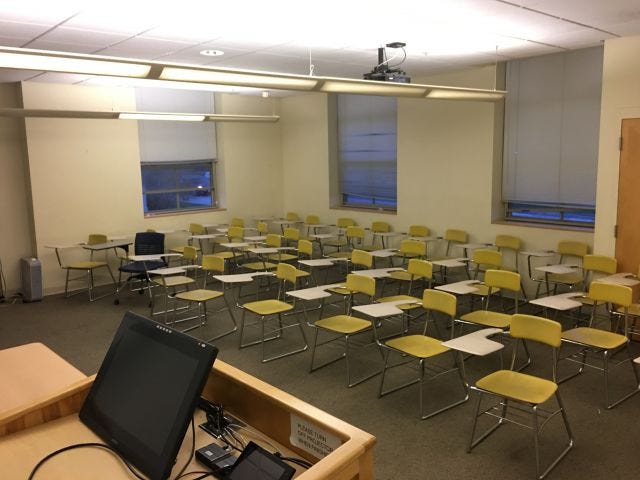RWL #175 - school’s out!

Greetings from the University of New Hampshire - Forward Operating Base Last Homely House (FOB LHH)! I turned in grades on Wednesday, so summer has officially begun for me! Woo-hoo! If only I wasn’t in quarantine… But we’ll make the best of it.
Today would have been the senior banquet for the students graduating from our undergraduate program. So in their honor, I have made a special podcast (more in Listen below). I have a tradition of posting a picture of my empty classroom after the last final each year, along with The Load Out from Jackson Browne:
But when that last guitar's been packed away
You know that i still want to play
So just make sure you got it all set to go
Before you come for my piano
The end of the semester is always bittersweet. Each semester is like a marathon - at the beginning it feels like it will never end, and then suddenly the finish line looms up in the distance and it’s a mad sprint. When it’s over, you stand there for a minute trying to catch your breath, but then you have a sense of emptiness. What is a runner without a race? What is a teacher without students?
Here’s this week’s links. I hope you find them useful - as usual, feedback is welcome. Stay well out there.
Read
What: HBR, What It Takes to Run a Great Virtual Meeting
https://hbr.org/2020/03/what-it-takes-to-run-a-great-virtual-meeting
Why: Most of us - probably anyone reading this - have suddenly been plunged into the world of work from home. What works (or barely works) in the face-to-face world can completely fail in the virtual world. When you’re already mostly virtual, layering asynchronous elements is useful. For example, teaching this semester I did my lectures live, but if I had a sense that students weren’t grasping a topic, I’d do another lecture asynchronously and push it out with supporting notes. It was an interesting experience as I started to think of the class more fluidly than just being restricted to our twice weekly meetings.
What: Open-Source Psychometrics Project
https://openpsychometrics.org/
Why: This isn’t an article, but a web site that features a bunch of free personality tests - Big 5, Meyers-Briggs, etc. Something to play around with while in quarantine. I’ve posted similar links in the past. I generally don’t put a lot of value on any of these tests, but I do think they can be useful for starting a conversation and self-reflection. If you’re looking for “the” test to take, go with the Big 5 - it has the most respect in the social psych world.
Watch
What: TEDWomen2018, Carla Harris, How to find the person who can help you get ahead at work
Why: This is a great video that every young person should watch. I disagree with her on a couple of points - the first being the idea that a meritocracy is purely objective. I also disagree that a mentor cannot also be a sponsor. In fact, Lee Bewley and I have written about the idea that mentorship includes sponsorship. Without sponsorship, a mentor is really just a coach. But those disagreements aside, this is really solid advice, and provides a solid insight into how organizations work. Most organizations I have been a part of do not literally have round table meetings, but those kinds of discussions happen every day at the senior leader level. As human beings, one of our most basic activities is to talk about each other and evaluate the contributions of the tribe.
What: TEDxNaperville, Daria Long, How to manage your stress like an ER doctor
Why: This is such great, basic advice - to sort out what is urgent from what is just noisy. This is not a strength for me, and it is an area I continue to try to work on. I like her ready mode vs. crazy mode. I forget where I first saw the two by two that divides tasks into four quadrants based on two criteria: urgent/non-urgent, important/not-important. So you wind up with urgent-important, non-urgent-important, urgent-not-important, and non-urgent-not-important. The patient having issues with breathing is urgent-important; the patient carrying on about flavored coffee creamer urgent-not-important (really non-urgent-not-important except she will disrupt the rest of the organization, which she knows and why she is doing what she is doing). Triage is a great way of thinking about the problem.
Listen
What: Health Leader Forge, Quarantine Graduation Special (30 min)
https://healthleaderforge.blogspot.com/2020/05/quarantine-graduation-special.html
Why: This podcast is a switch from my usual approach. Because of the unusual circumstances of the COVID-19 crisis, the students who are graduating this spring are not having the usual opportunity to experience the traditions of transition. So in this episode I have compiled some advice from previous guests and added my own on at the end. We'll be back with guests as usual next month.
Thanks for reading and see you next week! If you come across any interesting stories, won't you send them my way? I'd love to hear what you think of these suggestions, and I'd love to get suggestions from you. Feel free to drop me a line at mark.bonica@unh.edu , or you can tweet to me at @mbonica .
Also, if you find these links interesting, won’t you tell a friend? They can subscribe here: https://tinyletter.com/markbonica
See you next Friday!
Mark
Mark J. Bonica, Ph.D., MBA, MS
Assistant Professor
Department of Health Management and Policy
University of New Hampshire
(603) 862-0598
mark.bonica@unh.edu
Health Leader Forge Podcast: http://healthleaderforge.org
'It is the small things, everyday deeds of ordinary folk, that keep the darkness at bay. Simple acts of kindness and love.' - Gandalf (The Hobbit: An Unexpected Journey)


